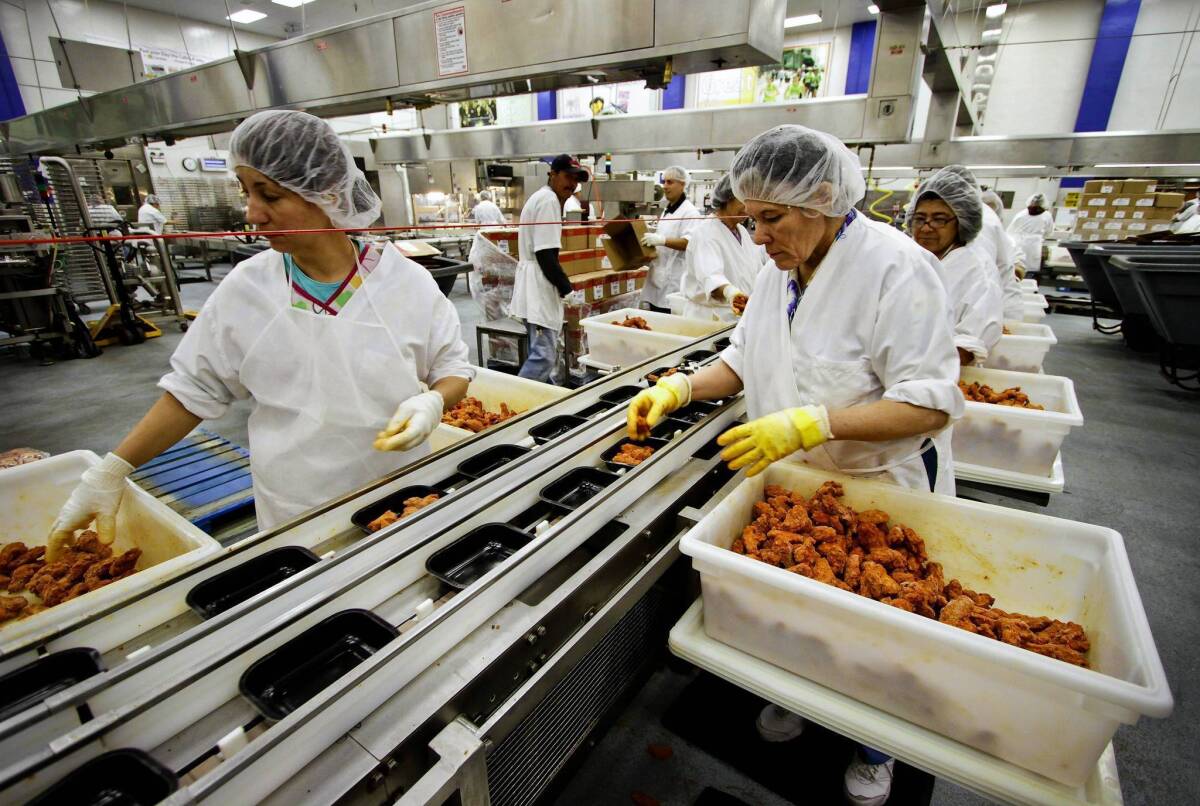Alliance of big city school districts aims for more healthful meals

Fatty corn dogs and sugary coffee cake may become extinct in thousands of school cafeterias nationwide under a landmark new alliance among Los Angeles Unified and five other major urban school districts to leverage their vast purchasing power for healthier fare and lower prices.
School districts in L.A., New York, Chicago, Dallas, Miami and Orlando, Fla., plan to announce Thursday efforts to use their collective clout — 2.5 million daily meals served and $530 million annually spent — to make wholesome food a national standard. The districts are also aiming for more eco-friendly practices — replacing polystyrene and plasticwith biodegradable trays and flatware, for instance.
As such diet-related maladies as diabetes and obesity increase among children, the quest to reduce fat, sugar and sodium in school meals has gained new urgency among districts. L.A. Unified has overhauled its menu with whole grains and fresh produce; New York offers a salad bar at every school; and Chicago has swapped cupcakes for fruit at school celebrations.
Now, by joining forces, the alliance members hope to move the market and eventually enlist other school districts in the crusade. Already, San Diego, Oakland and Houston have expressed interest.
“As the great cities of the nation, we want to lead the way,” said Eric Goldstein of the New York City school district, which serves 860,000 meals daily at 1,700 campuses.
Each alliance member has been assigned to a specific project. New York, for example, is working on lowering prices for organic, free-range chicken. Chicago currently serves such meat but can only afford to do so once a month — one organic chicken leg costs 40 cents while a non-organic leg-thigh combo is just 23 cents, according to Leslie Fowler of the Chicago Public Schools.
Likewise, environmentally sound trays and utensils are relatively expensive. Fowler said a biodegradable tray costs 12 cents while a polystyrene one is a third that price. Miami is working on trays while Orlando is researching better flatware than the plastic “spork.” Los Angeles is heading up communications efforts.
David Binkle, L.A. Unified’s food services director, said the alliance marks the biggest step yet to transform school meals. In the last few years, the nation’s second-largest district has banned flavored milk and overhauled the menu — dropping such crowd favorites as nachos and chicken nuggets for dishes like whole-grain spaghetti. Some of the menu items have flopped — quinoa salad, vegetable curry and brown rice cutlets, for instance, have been axed. But others, such as vegetarian burritos, have proved popular, Binkle said.
The district, which serves 650,000 meals daily, also started a program to serve healthy breakfasts in the classroom and recently eliminated polystyrene trays.
In Chicago, Mayor Rahm Emanuel launched a “Healthy Chicago” initiative that includes changes in the schools. Sugary drinks have been removed from vending machines, which now serve only water and 100% fruit juice in containers no larger than 8 ounces, Fowler said. Under a new school party policy, teachers are encouraged to serve fun but nutritious food, such as “ants on a log” with celery, peanut butter and raisins, she said.
The new Urban School Food Alliance first met last summer in Denver and has since conferred regularly by teleconference to share and review menu items that use whole grain products, low-fat dairy, fresh produce and lean protein.
To demonstrate their collective mission, alliance members plan to serve the same lunch at all six school districts in March. The menu: savory roasted chicken, brown rice with seasoned black or red beans, steamed broccoli, fresh seasonal fruit and milk.
“It’s a long way from a peanut butter sandwich,” Binkle said.
More to Read
Sign up for Essential California
The most important California stories and recommendations in your inbox every morning.
You may occasionally receive promotional content from the Los Angeles Times.











